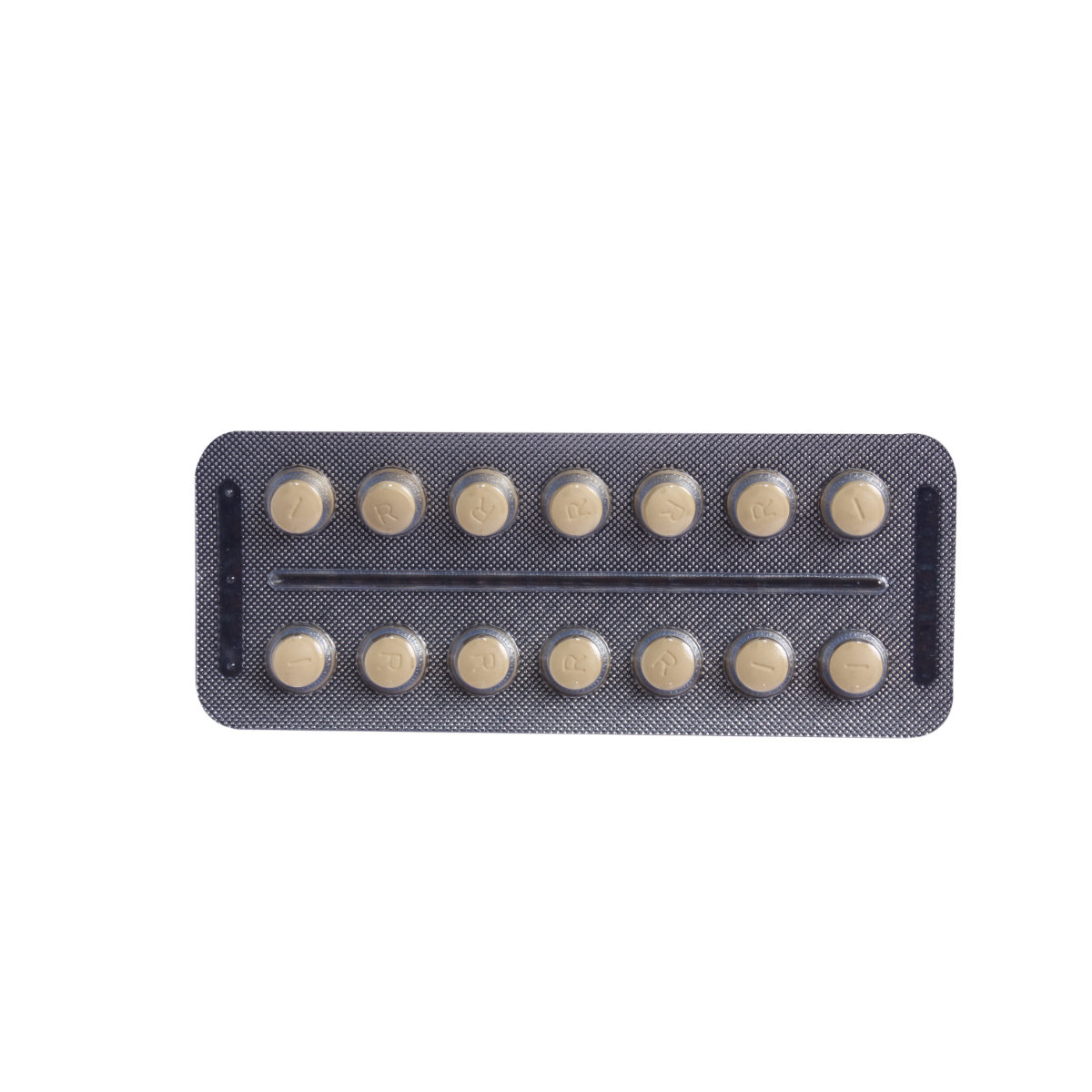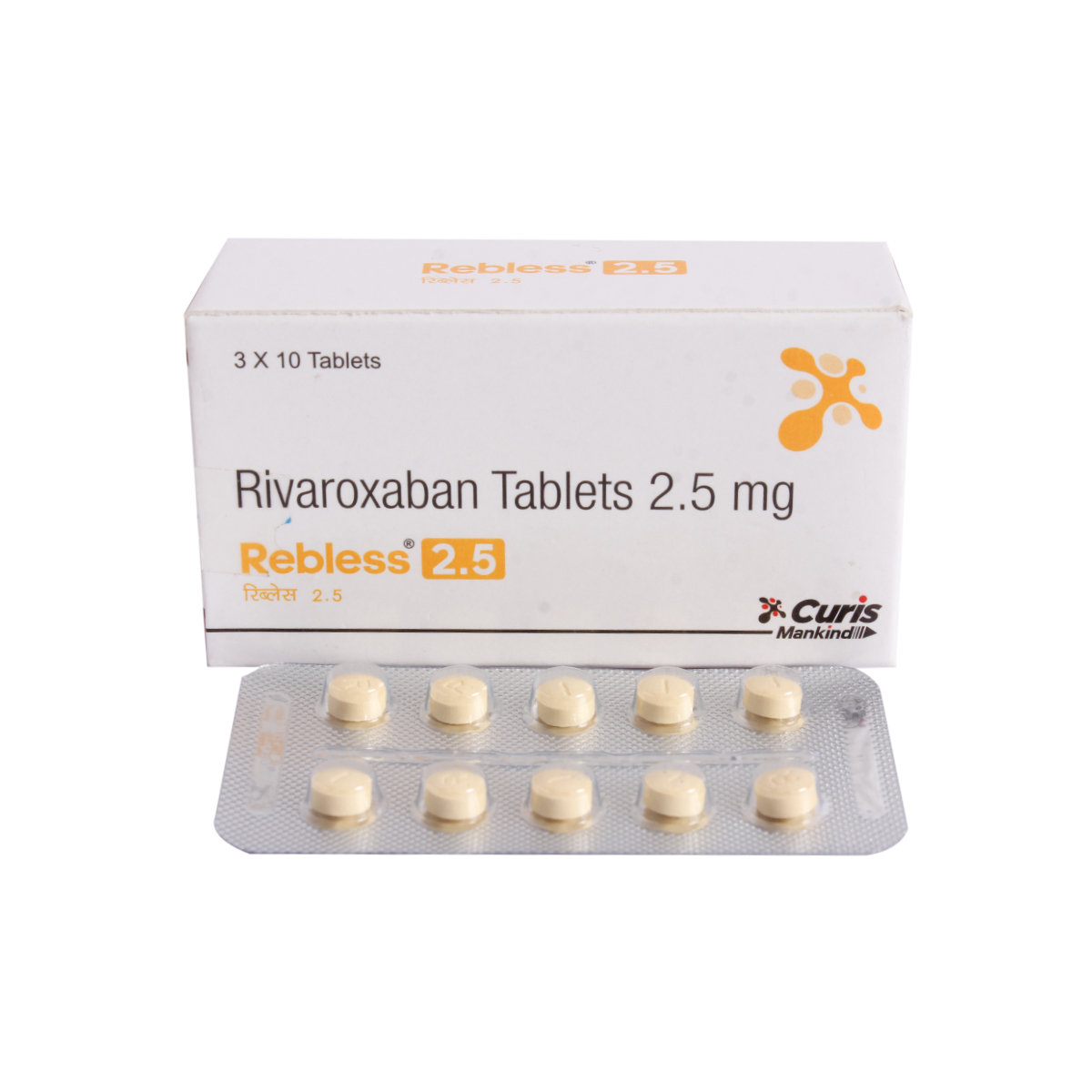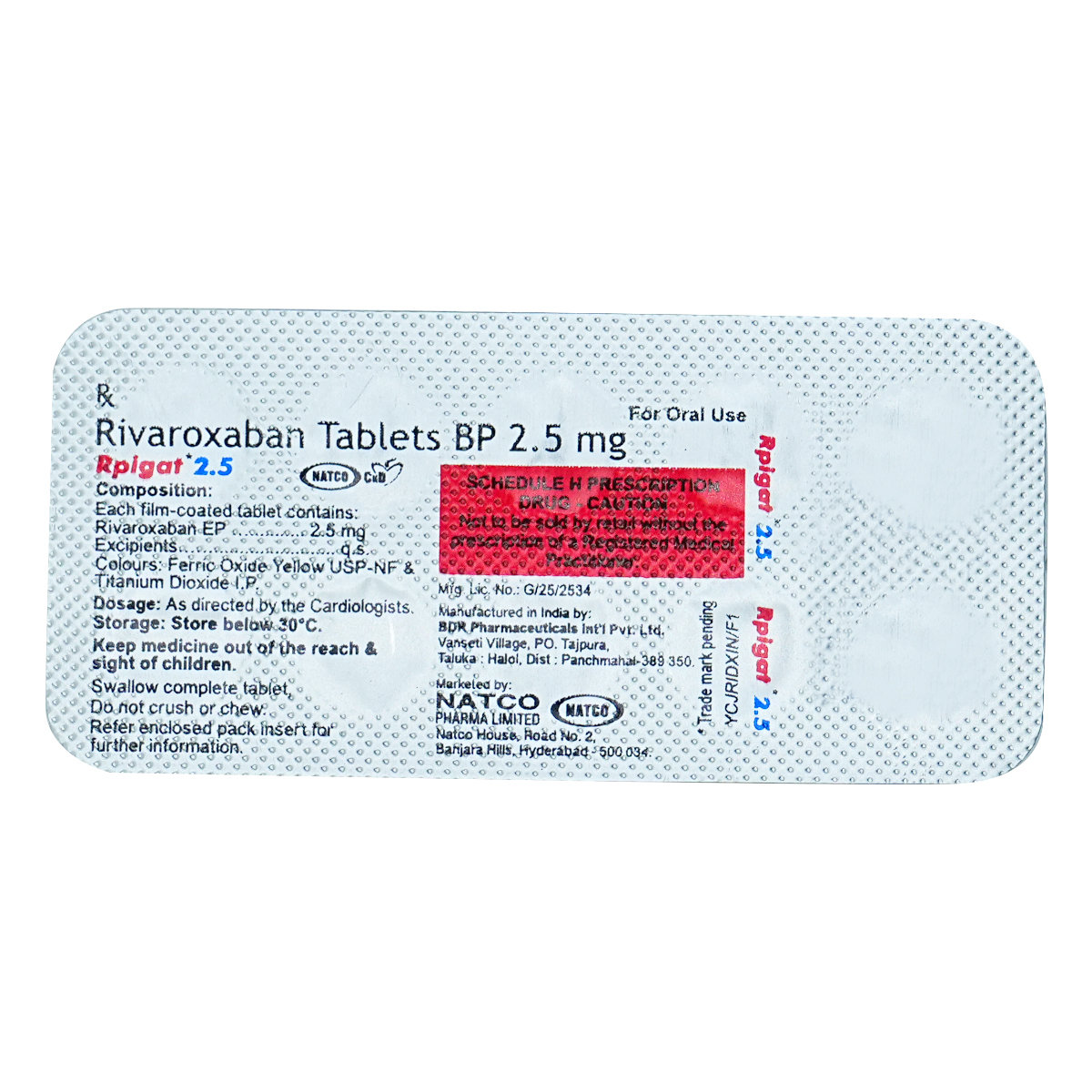Rivaflo 2.5 Tablet 10's
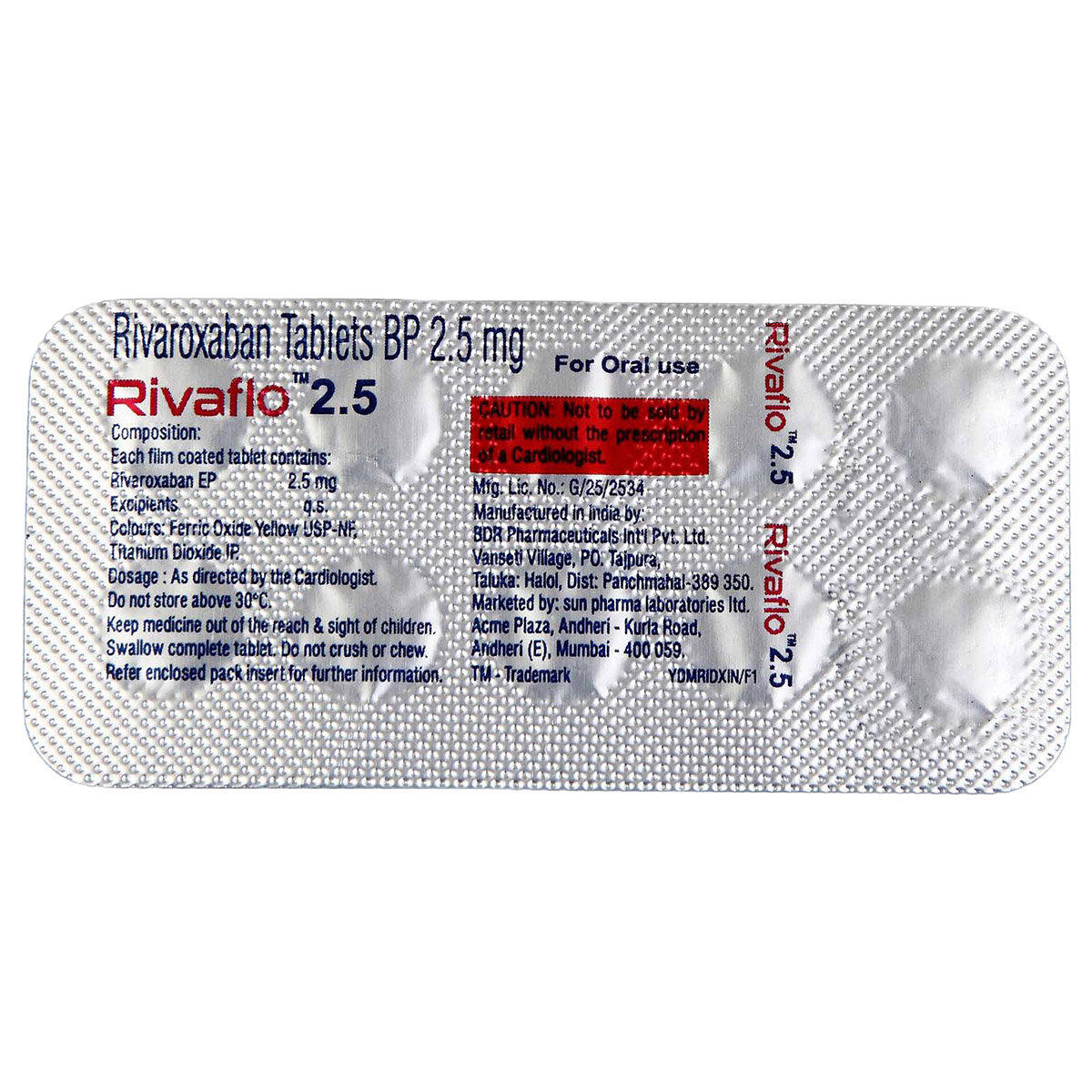
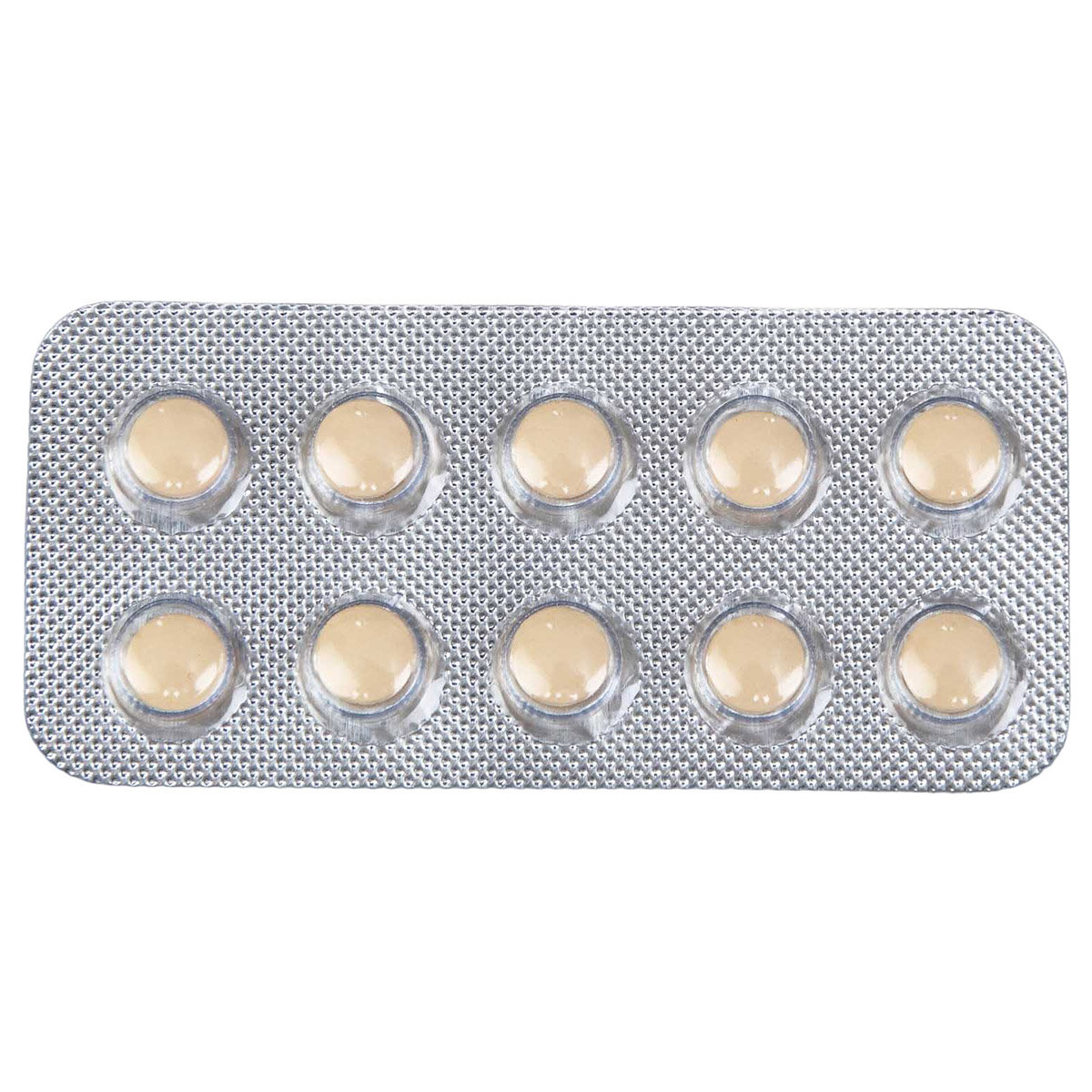
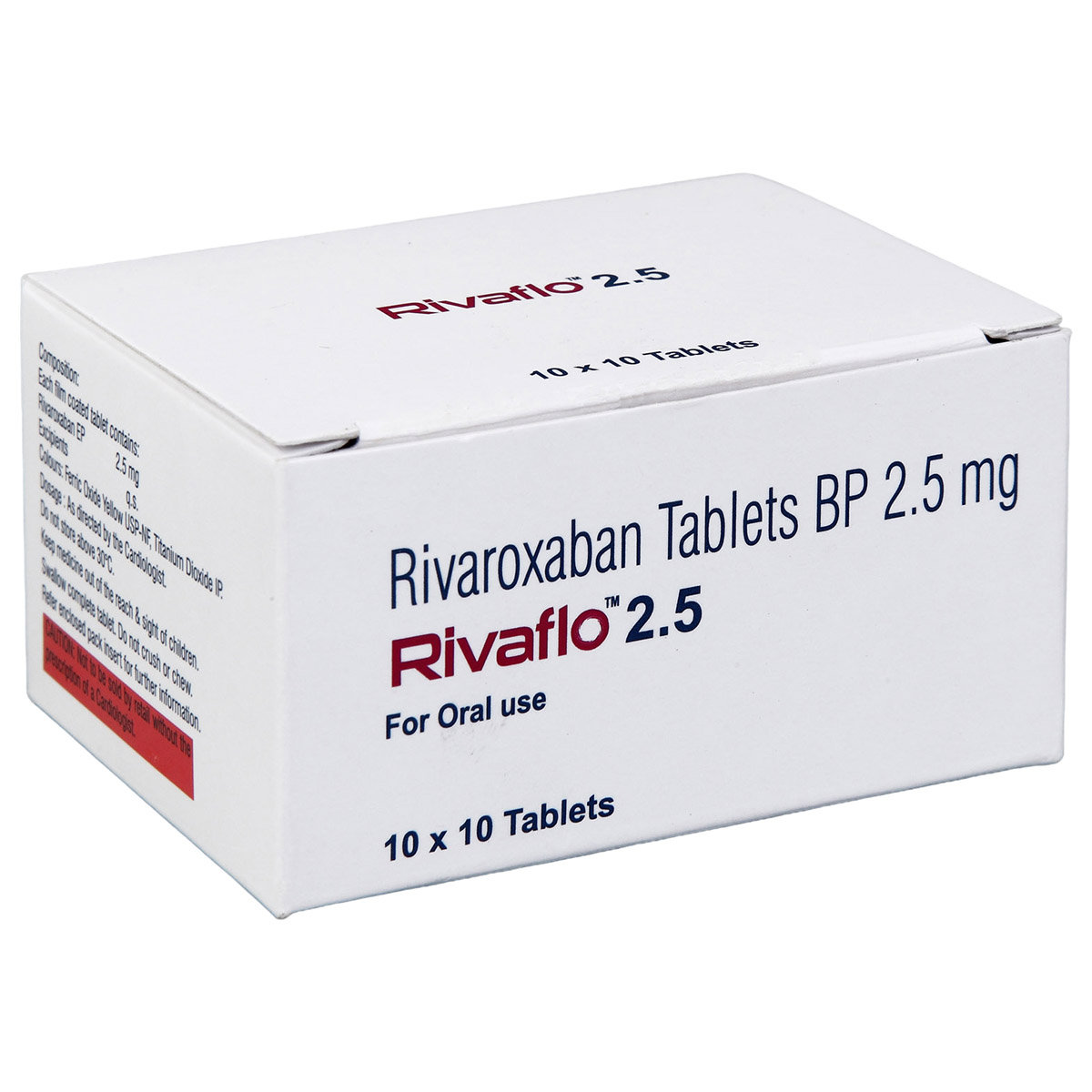
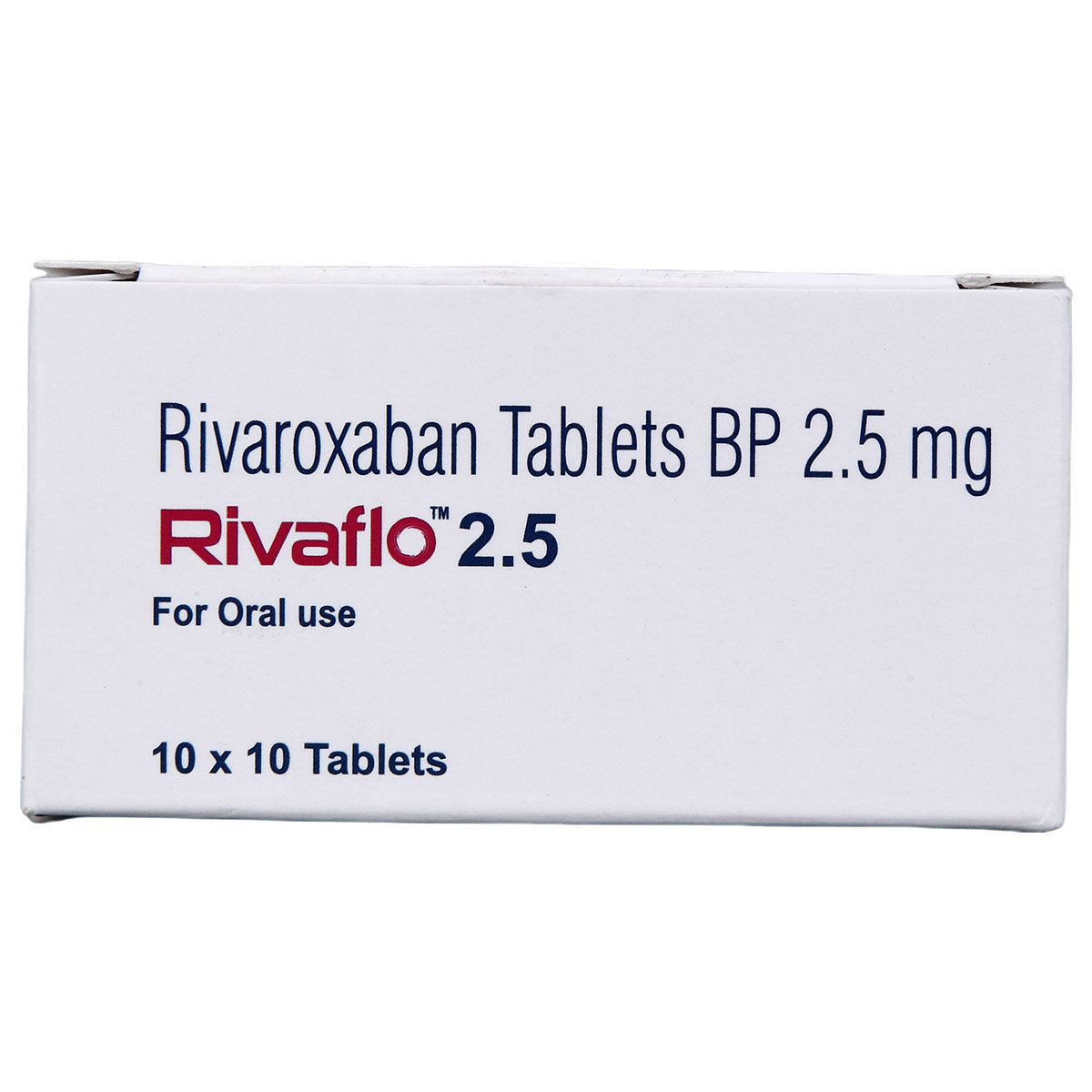
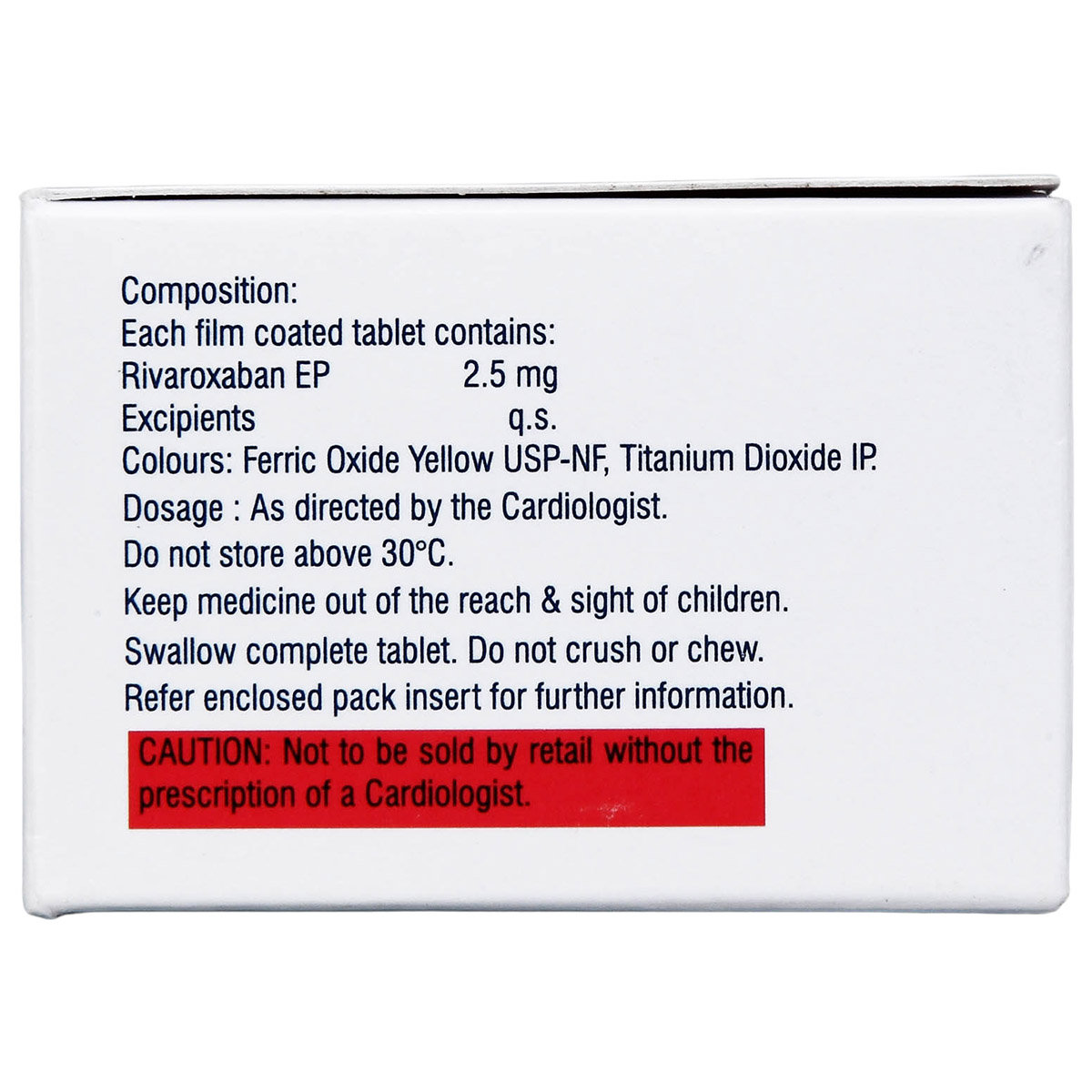
MRP ₹177
(Inclusive of all Taxes)
₹26.6 Cashback (15%)
RIVAFLO 2.5 TABLETS is used to prevent and treat blood clots in the legs (deep vein thrombosis) and lungs (pulmonary embolism). It contains Rivaroxaban, a blood thinner that works by blocking certain clotting factors in the blood, which helps to prevent clots from forming. By doing this, it reduces the risk of serious conditions, such as stroke or blocked blood vessels. You may experience some common side effects may including bleeding, low red blood cell count (anemia), and nausea. Before taking RIVAFLO 2.5 TABLETS , let your doctor know if you are allergic to any of its ingredients, if you are pregnant or breastfeeding, and about any other medicines you are taking or any health problems you have.
Know Your Delivery Time
Provide Delivery Location

Secure Payment

India's Most Trusted Pharmacy

Genuine Products
Composition :
Manufacturer/Marketer :
Consume Type :
Return Policy :
Expires on or after :
About RIVAFLO 2.5 TABLETS
RIVAFLO 2.5 TABLETS is mainly used to prevent and treat blood clots in the legs (called deep vein thrombosis or DVT) and in the lungs (called pulmonary embolism or PE). Deep vein thrombosis is a medical condition in which blood clots form in deep veins, usually in the legs. Pulmonary embolism is a condition in which a blood clot blocks the arteries in the lungs.
RIVAFLO 2.5 TABLETS contains Rivaroxaban, a blood thinner that works by inhibiting the production of clotting factors by decreasing the action of vitamin K. This prevents the conversion of fibrinogen (soluble protein) to fibrin (insoluble protein), thereby preventing blood clots.
In some cases, RIVAFLO 2.5 TABLETS may cause some common side effects such as bleeding, anemia (low number of red blood cells), and nausea. Most of these side effects of RIVAFLO 2.5 TABLETS do not require medical attention and gradually resolve over time. However, talk to your doctor if you experience these side effects continuously.
Tell your doctor if you are allergic to RIVAFLO 2.5 TABLETS or any other medicines. Consult your doctor before using RIVAFLO 2.5 TABLETS if you are pregnant, planning to become pregnant, or breastfeeding. Inform your doctor if you have a stomach ulcer, kidney or liver problems, high blood pressure, or any bleeding disorders before starting RIVAFLO 2.5 TABLETS .
Uses of RIVAFLO 2.5 TABLETS
RIVAFLO 2.5 TABLETS is used to prevent and treat blood clots. The detailed uses of RIVAFLO 2.5 TABLETS are as follows:
- Treatment of deep vein thrombosis (DVT): RIVAFLO 2.5 TABLETS is used to manage blood clots in the deep veins.
- Treatment of pulmonary embolism (PE): RIVAFLO 2.5 TABLETS treats clots in the lungs that may cause chest pain and breathing difficulties.
- Stroke prevention in atrial fibrillation: RIVAFLO 2.5 TABLETS reduces the risk of stroke and systemic embolism in patients with nonvalvular atrial fibrillation.
- Prevention of DVT and PE recurrence: RIVAFLO 2.5 TABLETS reduces the chance of blood clot reformation following initial treatment.
- Post-surgical DVT prevention: RIVAFLO 2.5 TABLETS is used after knee or hip replacement surgery to prevent clot formation.
- Treatment of venous thromboembolism (VTE): RIVAFLO 2.5 TABLETS is effective in treating blood clots in veins that can spread to the lungs.
- Risk reduction in coronary artery disease (CAD): RIVAFLO 2.5 TABLETS lowers the chance of heart attacks and related complications.
- Risk reduction in peripheral artery disease (PAD):RIVAFLO 2.5 TABLETS reduces clotting risks in the limbs, particularly after procedures like revascularization.

Have a query?
Directions for Use
- RIVAFLO 2.5 TABLETS can be taken with or without food as advised by your doctor.
- Follow your doctor's instructions on the dosage and timing of this medication to ensure safety.
- Swallow RIVAFLO 2.5 TABLETS as a whole with a glass of water.
- Do not chew, crush or break it.
Medicinal Benefits
- RIVAFLO 2.5 TABLETS belongs to a class of drugs known as anticoagulants or blood thinners. RIVAFLO 2.5 TABLETS is primarily used to prevent and treat deep vein thrombosis (blood clots in leg veins) and pulmonary embolism (blood clots in the lung) by reducing blood clot formation.
- RIVAFLO 2.5 TABLETS works by inhibiting the production of clotting factors by decreasing the action of vitamin K. This prevents the conversion of fibrinogen (soluble protein) to fibrin (insoluble protein), thereby preventing blood clots.
- RIVAFLO 2.5 TABLETS helps to reduce the chance of serious complications, such as heart attack, stroke, or lung damage caused by blood clots.
How RIVAFLO 2.5 TABLETS Works
Storage
- Inform your doctor about the nausea and discuss possible alternatives to the medication or adjustments to the dosage.
- Divide your daily food intake into smaller, more frequent meals to reduce nausea.
- Opt for bland, easily digestible foods like crackers, toast, plain rice, bananas, and applesauce.
- Avoid certain foods that can trigger nausea, such as fatty, greasy, spicy, and smelly foods.
- Drink plenty of fluids, such as water, clear broth, or electrolyte-rich beverages like coconut water or sports drinks.
- Use ginger (tea, ale, or candies) to help relieve nausea.
- Get adequate rest and also avoid strenuous activities that can worsen nausea.
- Talk to your doctor about taking anti-nausea medication if your nausea is severe.
- Record when your nausea occurs, what triggers it, and what provides relief to help you identify patterns and manage your symptoms more effectively.
- Inform your doctor about your constipation symptoms. They may adjust your medication or advise alternative treatments.
- Stay hydrated by drinking sufficient of water (at least 8-10 glasses a day) to help soften stool and promote bowel movements.
- Increase fibre intake by eating foods high in fibre, such as fruits, whole grains, vegetables and legumes, to help bulk up the stool.
- Establish a bowel routine by trying to go to the bathroom at the same time each day to train your bowels.
- Engaging in regular exercise, like walking or yoga, can support in bowel movement stimulation.
- Consult your doctor if constipation persists, and discuss alternative treatments or adjustments to your medication.
- Inform your doctor about dizziness symptoms. They may adjust your medication regimen or prescribe additional medications to manage symptoms.
- Follow your doctor's instructions for taking medication, and take it at the same time every day to minimize dizziness.
- When standing up, do so slowly and carefully to avoid sudden dizziness.
- Avoid making sudden movements, such as turning or bending quickly, which can exacerbate dizziness.
- Drink plenty of water throughout the day to stay hydrated and help alleviate dizziness symptoms.
- If you're feeling dizzy, sit or lie down and rest until the dizziness passes.
- Track when dizziness occurs and any factors that may trigger it, and share this information with your doctor to help manage symptoms.
- Regularly exercise and have a balanced diet to maintain a healthy weight.
- Eat lot of fruits and vegetables (minimum 5 servings/day).
- Include vitamin K-rich foods for stable anticoagulation control.
- Limit red and processed meats.
- Avoid smoking and consumption of alcohol.
- Changes in kidney function need immediate medical attention.
- Always monitor your blood pressure and inform your healthcare team if there are any sudden changes.
- Take medicines as prescribed and eat a balanced diet suggested by your dietician for healthy kidney function.
- Physical activity and exercise must be included in your daily routine to have proper kidney functioning and to maintain a healthy weight.
- Get enough sleep to reduce the stress levels that have a direct impact on your kidney functioning.
- Avoid massaging the bruise, as this might worsen the damage to the injured tissue.
- Resting the affected area helps prevent more injury and aids healing.
- Place a cloth-wrapped ice pack or cold compress on the affected area for 10 to 15 minutes.
- If the bruise is extensive, severe, or accompanied by other symptoms like warmth, redness, or swelling, get medical help.
What if I have taken an overdose of RIVAFLO 2.5 TABLETS
Drug Warnings
- RIVAFLO 2.5 TABLETS should be used with caution in children. Prolonged use of RIVAFLO 2.5 TABLETS may cause hair loss. Regular blood tests are recommended while taking RIVAFLO 2.5 TABLETS to check the time taken for your blood to clot and the level of platelets (blood cells).
- If you are known to be allergic to RIVAFLO 2.5 TABLETS or any other medicines, please tell your doctor. Consult your doctor before using RIVAFLO 2.5 TABLETS if you are pregnant, planning to become pregnant, or breastfeeding.
- If you have a stomach ulcer, kidney or liver problems, high blood pressure, or bleeding problems, inform your doctor before taking RIVAFLO 2.5 TABLETS .
- Avoid alcohol and painkillers like ibuprofen unless your doctor says it's safe, as they can increase the risk of bleeding.
Drug-Drug Interactions
Drug-Drug Interactions
Login/Sign Up
Co-administration of flurbiprofen and Rivaflo 2.5 Tablet can increase the risk of bleeding problems.
How to manage the interaction:
Co-administration of flurbiprofen and Rivaflo 2.5 Tablet can lead to an interaction, but it can be taken if your doctor has advised it. However, if you experience dizziness; lightheadedness, red or black, tarry stools, coughing up or vomiting fresh or dried blood that looks like coffee grounds, severe headache; and weakness contact your doctor immediately. Do not discontinue any medications without first consulting your doctor.
Coadministration of Rivaflo 2.5 Tablet together with ketorolac may increase the risk of bleeding problems.
How to manage the interaction:
Although taking Ketorolac and Rivaflo 2.5 Tablet together can possibly result in an interaction, but it can be taken together if prescribed by a doctor. However, consult your doctor if you experience any unusual bleeding, dizziness, lightheadedness, red or black, tarry stools, coughing up or vomiting fresh or dried blood that looks like coffee grounds, severe headache, and weakness. Do not discontinue any medications without consulting a doctor.
Coadministration of Ketoconazole and Rivaflo 2.5 Tablet can increase the blood levels of Rivaflo 2.5 Tablet and increase the risk of bleeding complications.
How to manage the interaction:
Taking ketoconazole and Rivaflo 2.5 Tablet together can lead to an interaction, it can be taken if advised by a doctor. However, if you experience any symptoms like unusual bleeding or bruising, dizziness, lightheadedness, red or black, tarry stools, coughing up or vomiting fresh or dried blood that looks like coffee grounds, severe headache, and weakness, consult the doctor immediately. Do not stop using any medications without a doctor's advice.
Coadministration of piroxicam and Rivaflo 2.5 Tablet can increase the risk of bleeding problems.
How to manage the interaction:
Co-administration of piroxicam and Rivaflo 2.5 Tablet can lead to an interaction, it can be taken if advised by a doctor. However, if you experience any symptoms like unusual bleeding or bruising, dizziness, lightheadedness, red or black, tarry stools, coughing up or vomiting fresh or dried blood that looks like coffee grounds, severe headache, and weakness, consult the doctor immediately. Do not stop using any medications without a doctor's advice.
Co-administration of Meloxicam and Rivaflo 2.5 Tablet can increase the blood levels of Rivaflo 2.5 Tablet and increase the risk of bleeding.
How to manage the interaction:
Co-administration of Meloxicam and Rivaflo 2.5 Tablet can lead to an interaction, it can be taken if advised by a doctor. However, if you experience any symptoms like unusual bleeding or bruising, dizziness, lightheadedness, red or black, tarry stools, coughing up or vomiting fresh or dried blood that looks like coffee grounds, severe headache, and weakness, consult the doctor immediately. Do not stop using any medications without a doctor's advice.
Co-administration of phenytoin and Rivaflo 2.5 Tablet may reduce the blood levels of Rivaflo 2.5 Tablet, which may increase the risk of bleeding problems.
How to manage the interaction:
Co-administration of phenytoin and Rivaflo 2.5 Tablet can lead to an interaction, it can be taken if advised by a doctor. consult the doctor immediately for any queries. Do not stop using any medications without a doctor's advice.
Co-administration of ruxolitinib and Rivaflo 2.5 Tablet can increase the risk or severity of bleeding problems.
How to manage the interaction:
Co-administration of ruxolitinib and Rivaflo 2.5 Tablet can lead to an interaction, it can be taken if advised by your doctor. However, if you experience any symptoms like unusual bleeding or bruising, dizziness, lightheadedness, red or black, tarry stools, coughing up or vomiting fresh or dried blood that looks like coffee grounds, severe headache, and weakness, consult the doctor immediately. Do not stop using any medications without a doctor's advice.
Co-administration of Prasugrel and Rivaflo 2.5 Tablet can increase the risk of bleeding problems.
How to manage the interaction:
Co-administration of prasugrel and Rivaflo 2.5 Tablet can lead to an interaction, it can be taken if advised by a doctor. However, if you experience any symptoms like unusual bleeding or bruising, dizziness, lightheadedness, red or black, tarry stools, coughing up or vomiting fresh or dried blood that looks like coffee grounds, severe headache, and weakness, consult the doctor immediately. Do not stop using any medications without a doctor's advice.
Co-administration of Etodolac and Rivaflo 2.5 Tablet can increase the risk of bleeding problems, including severe hemorrhage.
How to manage the interaction:
Co-administration of Etodolac and Rivaflo 2.5 Tablet can lead to an interaction, it can be taken if advised by a doctor. However, if you experience any symptoms like unusual bleeding or bruising, dizziness, lightheadedness, red or black, tarry stools, coughing up or vomiting fresh or dried blood that looks like coffee grounds, severe headache, and weakness, consult the doctor immediately. Do not stop using any medications without a doctor's advice.
Coadministration of Mefenamic acid with Rivaflo 2.5 Tablet can increase the risk or severity of gastric bleeding, ulceration, and rarely, perforation leading to serious blood loss.
How to manage the interaction:
Taking Mefenamic acid with Rivaflo 2.5 Tablet together can result in an interaction, it can be taken if your doctor has advised it. However, if you notice any unusual bleeding or bruising, other signs of bleeding, dizziness, lightheadedness, red or black tarry stools, coughing up or vomiting blood, severe headache, and weakness, you should contact a doctor immediately. Do not stop using any medications without talking to a doctor.
Drug-Food Interactions
Drug-Food Interactions
Login/Sign Up
Diet & Lifestyle Advise
- Avoid making any changes in your diet without first talking to your doctor.
- Cranberry juice, grapefruit juice, noni juice, and pomegranate juice may interact with RIVAFLO 2.5 TABLETS and lead to unwanted side effects. Hence, try to avoid these juices while taking RIVAFLO 2.5 TABLETS .
- Avoid drinking alcohol as it increases the risk of gastrointestinal ulcer/bleeding.
Habit Forming
Therapeutic Class
All Substitutes & Brand Comparisons
RX
Rivaban 2.5 Tablet 14's
Lupin Ltd
₹62
(₹3.99 per unit)
74% CHEAPERRX
Out of StockRebless 2.5 Tablet 10's
Mankind Pharma Pvt Ltd
₹49
(₹4.41 per unit)
72% CHEAPERRX
Rpigat 2.5 mg Tablet 10's
Natco Pharma Ltd
₹51.5
(₹4.64 per unit)
70% CHEAPER
Alcohol
Unsafe
You are recommended to avoid consumption of alcohol with RIVAFLO 2.5 TABLETS as it may increase the risk of bleeding.
Pregnancy
Consult your doctor
Tell your doctor before using RIVAFLO 2.5 TABLETS because it may cause harmful effects. So, only use in that condition when a doctor is prescribed.
Breast Feeding
Consult your doctor
RIVAFLO 2.5 TABLETS may pass into breast milk. Therefore consult your doctor.
Driving
Safe if prescribed
RIVAFLO 2.5 TABLETS usually does not affect your ability to drive or operate machinery.
Liver
Caution
Take RIVAFLO 2.5 TABLETS with caution, especially if you have a history of Liver diseases/conditions. The dose may be adjusted by your doctor as required.
Kidney
Caution
Take RIVAFLO 2.5 TABLETS with caution, especially if you have a history of Kidney diseases/conditions. The dose may be adjusted by your doctor as required.
Children
Unsafe
RIVAFLO 2.5 TABLETS is not approved for children. Therefore RIVAFLO 2.5 TABLETS is not safe for children.
Heart
Safe if prescribed
RIVAFLO 2.5 TABLETS is safe for use in heart patients if adminitered by the physician
Geriatrics
Safe if prescribed
RIVAFLO 2.5 TABLETS can be safely used in elderly patients if prescribed by the physician. Close monitoring of the patient is needed.
FAQs
RIVAFLO 2.5 TABLETS is used to prevent and treat deep vein thrombosis (blood clots in leg veins) and pulmonary embolism (blood clots in the lung) by reducing blood clot formation.
No, you are not recommended to stop taking RIVAFLO 2.5 TABLETS without consulting your doctor to worsen the condition. Therefore, take RIVAFLO 2.5 TABLETS for as long as your doctor has prescribed it.
No, RIVAFLO 2.5 TABLETS is not expected to cause weight gain. If you notice unexpected weight gain and think it is because of this RIVAFLO 2.5 TABLETS , immediately consult your doctor and inform him about it.
RIVAFLO 2.5 TABLETS has many beneficial effects, but it has the ability to make you bleed more than normal. Even with minor injuries as it decreases your ability to blood clotting. Sometimes RIVAFLO 2.5 TABLETS may cause severe bleeding that may be dangerous and may require urgent medical care. This risk may be increased in people taking RIVAFLO 2.5 TABLETS along with other blood thinner medicines.
Avoid taking grapefruit and grapefruit juice while taking RIVAFLO 2.5 TABLETS , and it contains compounds that slow down the metabolism of RIVAFLO 2.5 TABLETS and increase the activity leading to bleeding.
It is not known that RIVAFLO 2.5 TABLETS causes hair loss. Kindly contact your doctor.
RIVAFLO 2.5 TABLETS is a type of medicine known as an anticoagulant. RIVAFLO 2.5 TABLETS works by stopping a clotting factor called factor Xa from working. This thins your blood, so it takes longer to clot.
You should take RIVAFLO 2.5 TABLETS just after a meal or snack, or as advised by the doctor. It is important to take it with food to help your body absorb the entire dose.
The side effects of RIVAFLO 2.5 TABLETS include bleeding, nausea and anemia (lack of blood). If these side effects persist or worsen, please consult your doctor.
Yes, RIVAFLO 2.5 TABLETS is a blood thinner. It prevents the blood from clotting inside the blood vessels and also prevents the blood clots from recurring in the blood vessels.
Avoid taking grapefruit and grapefruit juice while taking RIVAFLO 2.5 TABLETS as grapefruit contains compounds that slow down the RIVAFLO 2.5 TABLETS metabolism and increase the activity leading to bleeding. However, if you are taking some other blood thinner like warfarin, you should avoid taking any food that increases the vitamin K activity or increases the blood clotting such as brussels, spinach, sprouts, broccoli, mustard greens, asparagus and green tea. But, the use of these food items is not restricted with RIVAFLO 2.5 TABLETS .
Country of origin
Manufacturer/Marketer address
Customers Also Bought
Disclaimer
Author Details
We provide you with authentic, trustworthy and relevant information
Buy best Cardiology products by
Torrent Pharmaceuticals Ltd
Sun Pharmaceutical Industries Ltd
Lupin Ltd
Intas Pharmaceuticals Ltd
Cipla Ltd
Micro Labs Ltd
Macleods Pharmaceuticals Ltd
Abbott India Ltd
Ajanta Pharma Ltd
Ipca Laboratories Ltd
Eris Life Sciences Ltd
Mankind Pharma Pvt Ltd
Lloyd Healthcare Pvt Ltd
Dr Reddy's Laboratories Ltd
Emcure Pharmaceuticals Ltd
Alembic Pharmaceuticals Ltd
Glenmark Pharmaceuticals Ltd
Alkem Laboratories Ltd
Zydus Healthcare Ltd
East West Pharma India Pvt Ltd
USV Pvt Ltd
Aristo Pharmaceuticals Pvt Ltd
Alteus Biogenics Pvt Ltd
J B Chemicals & Pharmaceuticals Ltd
Elbrit Life Sciences Pvt Ltd
Fusion Health Care Pvt Ltd
Eswar Therapeutics Pvt Ltd
La Renon Healthcare Pvt Ltd
Zydus Cadila
Akumentis Healthcare Ltd
Hbc Life Sciences Pvt Ltd
Troikaa Pharmaceuticals Ltd
Knoll Healthcare Pvt Ltd
Corona Remedies Pvt Ltd
Morepen Laboratories Ltd
Shrrishti Health Care Products Pvt Ltd
Prevego Healthcare & Research Pvt Ltd
Lividus Pharmaceuticals Pvt Ltd
Medley Pharmaceuticals Ltd
Cadila Pharmaceuticals Ltd
Jubilant Lifesciences Ltd
Msn Laboratories Pvt Ltd
Zuventus Healthcare Ltd
Steris Healthcare
Ranmarc Labs
Elder Pharmaceuticals Ltd
Tas Med India Pvt Ltd
Unison Pharmaceuticals Pvt Ltd
Primus Remedies Pvt Ltd
Leeford Healthcare Ltd
Blue Cross Laboratories Pvt Ltd
Azkka Pharmaceuticals Pvt Ltd
Sanofi India Ltd
Sinsan Pharmaceuticals Pvt Ltd
Nirvana India Pvt Ltd
Knoll Pharmaceuticals Ltd
Orsim Pharma
Systopic Laboratories Pvt Ltd
Indiabulls Pharmaceuticals Pvt Ltd
RPG Life Sciences Ltd
Biochem Pharmaceutical Industries Ltd
Johnlee Pharmaceuticals Pvt Ltd
Olcare Laboratories Pvt Ltd
Vasu Organics Pvt Ltd
Cadila Healthcare Ltd
Econ Healthcare
Shine Pharmaceuticals Ltd
Xemex Life Sciences
Elicad Pharmaceuticals Pvt Ltd
Elinor Pharmaceuticals (P) Ltd
Sunij Pharma Pvt Ltd
Orris Pharmaceuticals
Atos Lifesciences Pvt Ltd
FDC Ltd
Lia Life Sciences Pvt Ltd
Pfizer Ltd
MEDICAMEN BIOTECH LTD
Nicholas Piramal India Ltd
Astra Zeneca Pharma India Ltd
Lakshya Life Sciences Pvt Ltd
Opsis Care Lifesciences Pvt Ltd
Alvio Pharmaceuticals Pvt Ltd
Biocon Ltd
Finecure Pharmaceuticals Ltd
Glynis Pharmaceuticals Pvt Ltd
Indoco Remedies Ltd
Med Manor Organics Pvt Ltd
Acmedix Pharma Llp
Allysia Lifesciences Pvt Ltd
Chemo Healthcare Pvt Ltd
Pficus De Med Pvt Ltd
Proqol Health Care Pvt Ltd
Divine Savior Pvt Ltd
Enovus Healthcare Pvt Ltd
Ergos Life Sciences Pvt Ltd
Samarth Life Sciences Pvt Ltd
Signova Pharma
ALICAN PHARMACEUTICAL PVT LTD
Auspharma Pvt Ltd
Maxford Labs Pvt Ltd
Recommended for a 30-day course: 3 Strips


